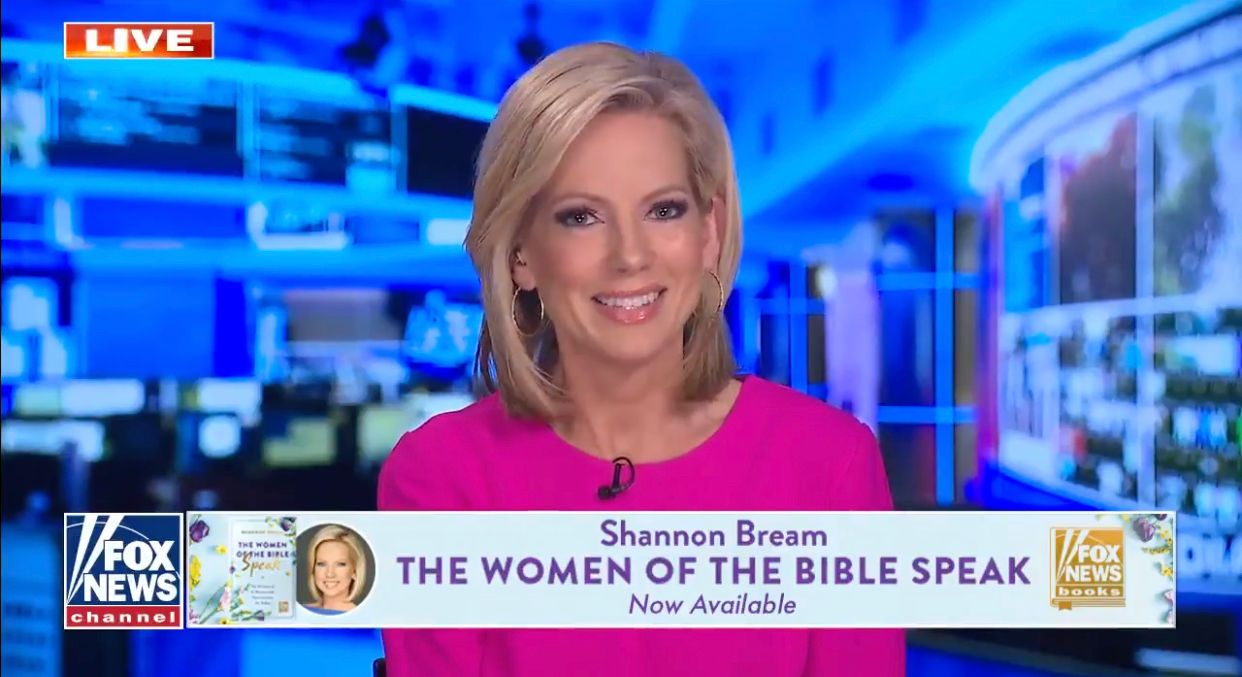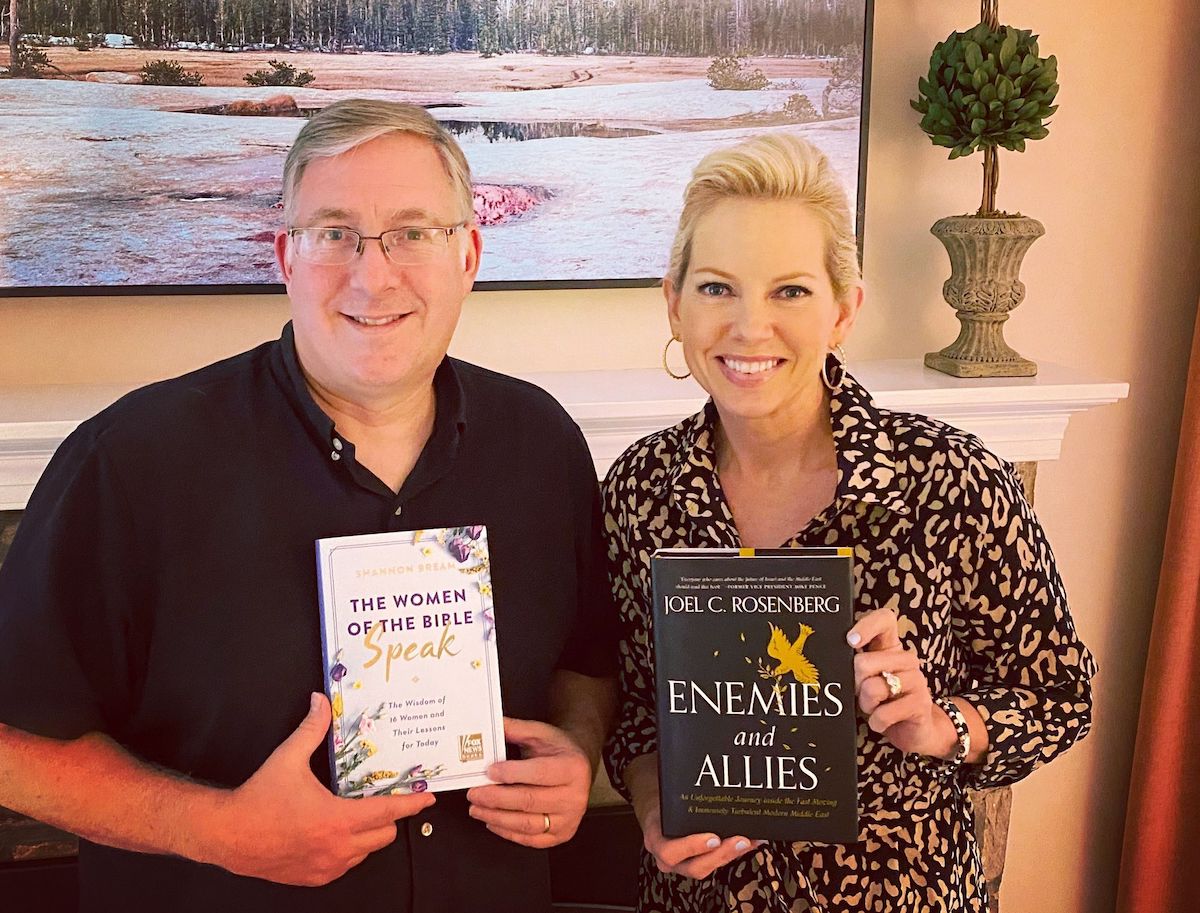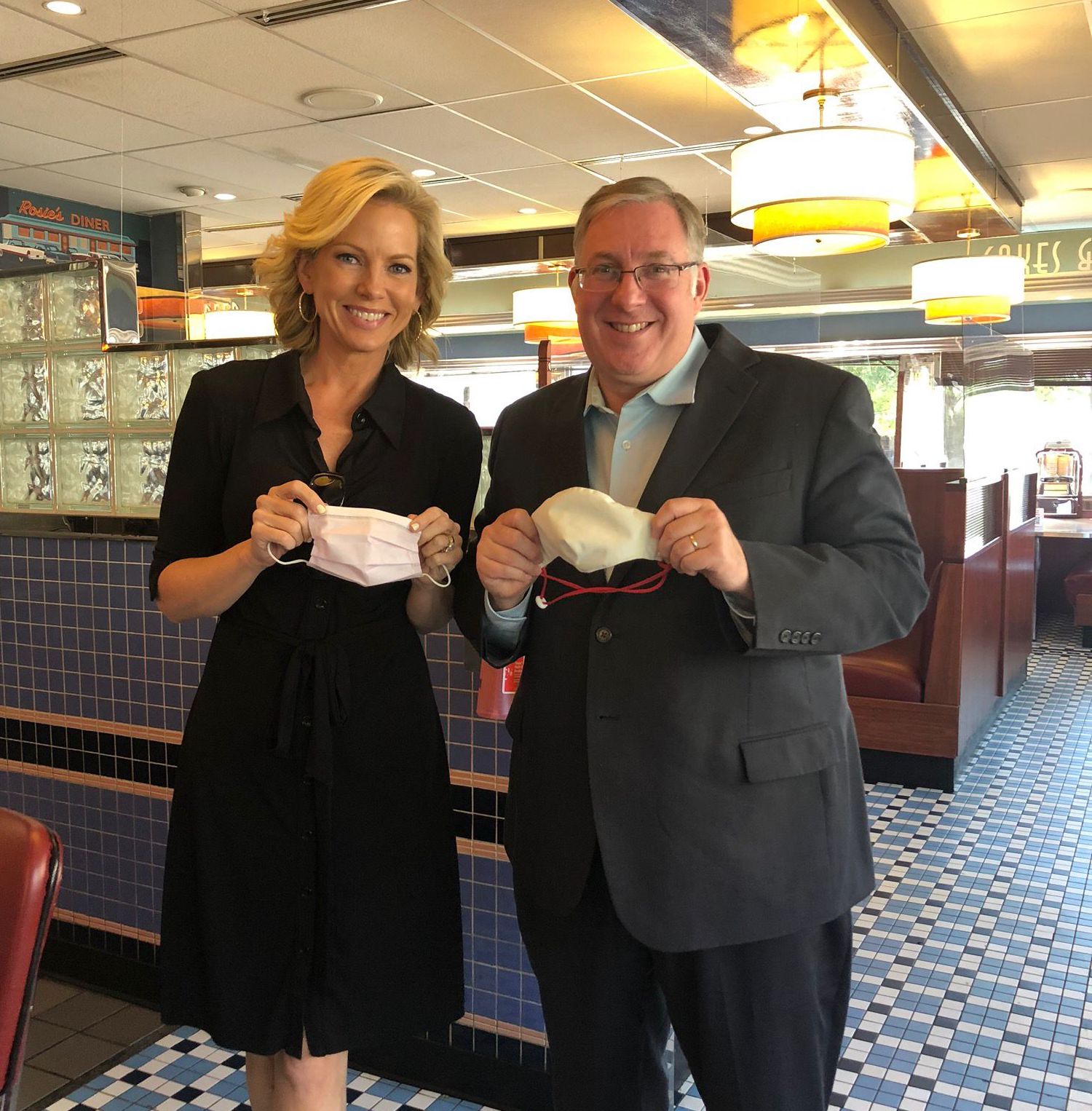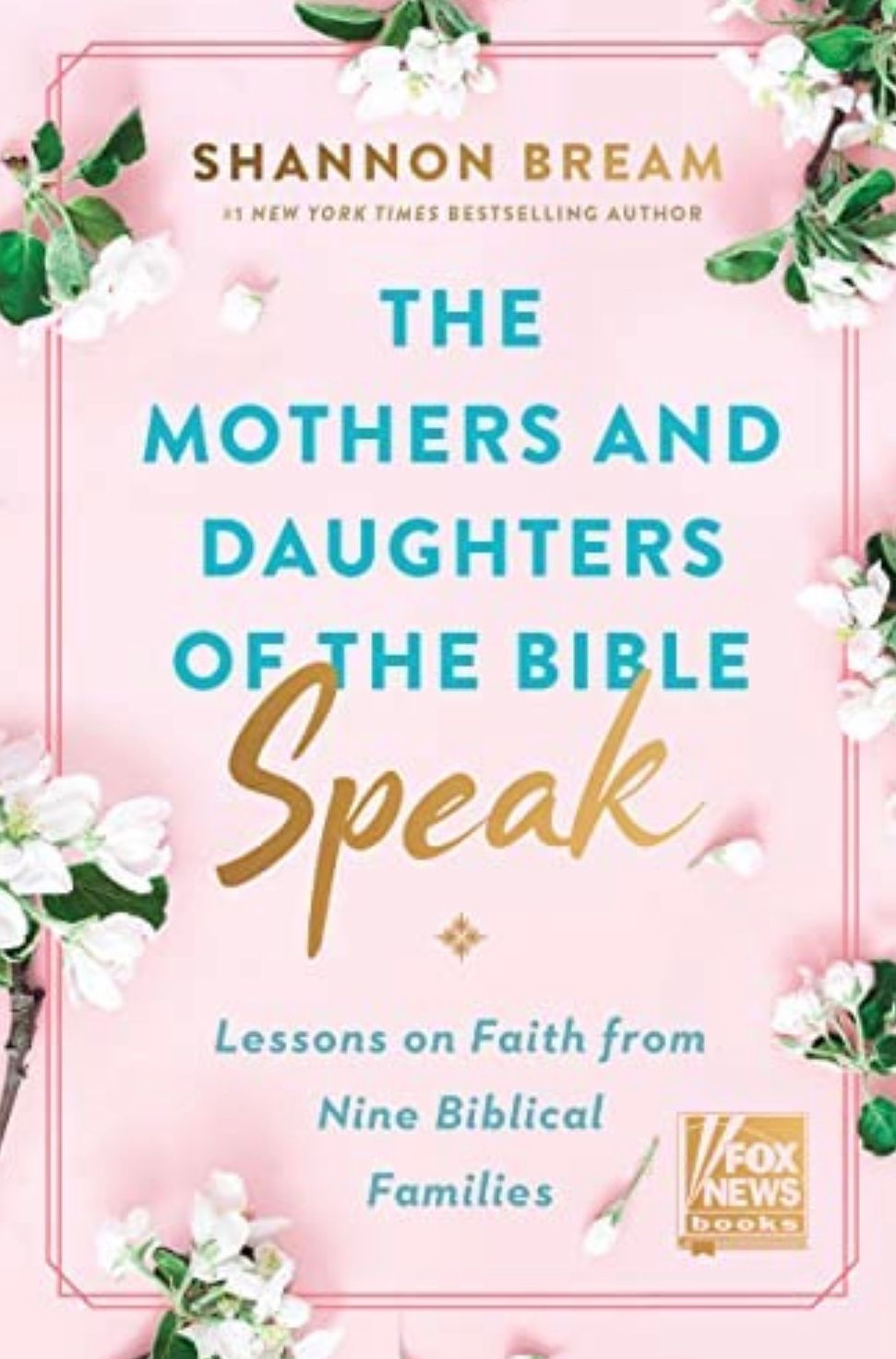As Shannon Bream’s new book debuts at #2 on New York Times list, Fox News anchor opens up to ALL ISRAEL NEWS about why Biblical stories of women’s triumphs and tragedies inspires her, and so many others

JERUSALEM—It’s not every day that a book about people that lived between 2,000 and 4,000 years ago becomes a monster best-seller.
So, what is the secret to Shannon Bream’s success?
How is she able to ignite so much interest in such ancient sagas?
As Jews celebrate the Biblical festival of Passover this week, and Christians have just celebrated the resurrection of Jesus, she has written a fantastic new book about the extraordinary women at the center of these and other dramatic moments in history.
“The Mothers and Daughters of the Bible Speak” is the latest book by Shannon, the anchor of Fox News at Night, a Liberty University graduate and a devout Evangelical Christian.
It debuted last week at #2 on the New York Times best-seller list. This week it’s #3.
It is also currently #12 of all books sold on Amazon worldwide.
Why is it resonating with so many readers, both women and men?
And what drew Shannon Bream to write this sequel to her #1 New York Times best-seller from last year, “The Women of the Bible Speak”?

Last year, I interviewed Shannon for ALL ISRAEL NEWS about her first runaway hit that sold more than 400,000 copies.
Now, I have interviewed her again, to go deeper, to better understand her passion for exploring and explaining the most famous women in the Bible, and some of the most obscure and least understood women in the Scriptures.
I encourage you to watch our interview or read the transcript below.
I also highly encourage you to buy copies of Shannon’s new book for the women and men in your life.
[You can order your copy by clicking here.]
It is, after all, our top pick for April in the ALL ISRAEL NEWS BOOK CLUB, and this interview will, I believe, help you understand why.
Here is the transcript of our conversation, lightly edited for clarity.
ROSENBERG: Hi. This is Joel Rosenberg, founder and editor-in-chief of ALL ISRAEL NEWS, and our sister site, ALL ARAB NEWS.
I'm very honored to speak to a dear friend and a great author – the huge, monster best-selling, #1 New York Times best- selling author Shannon Bream.
Shannon, thank you for coming back to talk to us at ALL ISRAEL NEWS.
SHANNON BREAM: It is always a treat to be with you, Joel.
ROSENBERG: I appreciate it and I'm very excited about your new book. I have it on Kindle and audio, but I don't have a hard copy yet. But I think you've got one with you. Will you hold it up?
BREAM: Yes – there you go!
ROSENBERG: “The Mothers and Daughters of the Bible Speak”. So, it just came out and I want to get into what you cover in the book. But I also want to get into why you wrote it. Obviously, the first one was a huge success, with more than 400,000 copies sold. I believe it was somewhere in that neighborhood.
BREAM: Last I heard. Not sure.
ROSENBERG: And it's still selling. And I remember when we when I interviewed you then for ALL ISRAEL NEWS. One of the things I remember saying was that it's not often that 2,000-year-old news becomes a big story and a New York Times #1 bestseller. But you found a way. I mean, God blessed you, but you did find a way of explaining and taking readers -- women, but also men – into a series of stories about women in the Bible that I think clearly, by definition, captured people's imagination. I want you to start with just a little bit of why you think that book resonated. You've had some more time to think about it. And then tell us how you went about thinking, “Okay, what more would I say in a new book, and how I might approach this book a little bit differently as a sequel?”
BREAM: Yeah, I mean, we were all surprised, if we're being honest, about how well received that [first] book was. And, you know, you and I have talked about the fact that I grew up knowing these stories. But I learned way more [about the Scriptures] in the process. And what you do is take the stories and remind people that the problems and struggles that they're facing today have been there over time and God has been working through those struggles – He sees them. And you try to personalize the story by [sharing] examples from today of how these [Biblical principles] can apply.
I think for some reason people [are] intimidated to pick up the Bible and [then] flip to I Samuel and start reading. But they may be more invited to look at a book that has a beautiful pink cover.
The stories are put into [my book in such a way] where they can read them, learn much more about these [Biblical] women's lives, and see how it connects and matters to their own lives. And I think it just felt more personal to people that we did it in that way because we didn't add to these stories. They're there [in the Bible]. God included them for a reason. But maybe it was the format [of my book] that connected with people.
And I certainly think people needed hope. It's been a very rough two years for everybody [due to the COVID pandemic]. I've heard from a lot of people – and you may have too – that they were really searching to find faith or reconnect with faith or after a lapse in that. And so, I think the book kind of filled those needs at a time when people were really struggling, needed encouragement, needed hope and inspiration, and needed a reminder that God is working through the difficult stories, through the beautiful stories, and that He is ever-present.
ROSENBERG: I think that's true, Shannon – all of it.
Also, I can't think of a lot of books that have gotten the type of attention yours did, having the platform of Fox News. And it wasn’t just your own show where your book was discussed. [I’m fascinated with] the whole concept of the new “Fox Books” imprint [through Harper Collins] and the idea [among Fox senior executives], “Why aren't we cross-promoting [our anchors’ books]? Why aren’t we letting other shows [on our network] talk about our own books?
But you can have as much exposure as you want – presidential candidates write books and they're on every show on the planet and [often] nobody buys [their books] in the end. So, it’s not just exposure. Books have to truly resonate with people to become popular.
I think in addition to what you said, I think there aren't that many books – except in academia – that really unpack what women in the Bible [think and say and do]. There is so much focus on the great heroes [of the Bible] and people immediately think of King David or Jesus or the Apostle Paul. Masculine, masculine, masculine. But what about the women [in the Bible]? And there's a lot of women in there. It's just that [talking about women in the Bible] is almost like “flyover country.” [Too often the women are ignored.] It's a terrible analogy. But some people think, “Yeah, yeah, women are in there, too.” But you have begun to put a spotlight on them.
BREAM: Yeah. And I think that's in the second book, “The Mothers and Daughters of the Bible Speak,” that we decided to look at women through a family lens and the [lens of] family relationships. Again, some beautiful and faithful and courageous and brave relationships. And some really super-dysfunctional, like [the] Dallas [TV show] on steroids – messed up in-laws trying to kill their son-in-law. You know, the whole thing.
And I love that all these stories are in the Bible, warts and all, because nobody's family is perfect. Everybody struggles with different relationships. And so, you know, this is a different lens. We look at the positive. We also look at the negative because I think you can learn from all of those.
But I think by giving these women the spotlight treatment – where we dig out their stories – we learn more about who they were, the customs of the time, the language of the time, what these stories really meant. I just think [readers] connected with [my first book] in a way that they can use these stories [in various ways, including] in Bible studies. We do study questions just so they can dig in more.
And I have people, much like me, who say, “I grew up in church. I heard these stories. I knew about Esther, or I knew about Mary, of course, the mother of Jesus, or Deborah, or some of these other characters, a little bit. But man, I had no idea there was so much detail about their lives in the Bible…especially with the Old Testament characters.”
I love to go and find sermons from rabbis, teachings from the Jewish faith, the Catholic faith, [from] Evangelicals, [from a variety of] people who have input into who these people were in the Bible and what their lives meant. It gives me a much richer, three-dimensional understanding of these women, and I end up coming away from them feeling like I know them personally. And I'm encouraged by their stories. And I really hope that that's how people, the readers, will feel, too.

ROSENBERG: I think that's a really interesting point. Let's take Mary, because you just mentioned the mother of Jesus. Clearly, the Roman Catholic Church puts way more emphasis on the importance of Mary than Evangelicals, or Protestants generally. And I don't think that as Protestants we're devaluing Mary. It's just that the Roman Catholic Church has put such a high emphasis on her. And I think actually they're right {to emphasis her important role]. You know, theologically, I think they go a little too far. We don't have to get into the theology at the moment. But the point is: I don't think we spend enough time thinking about what an extraordinary woman Mary was. What are some of your takeaways from her? And then I want you to go into [some of the women in the Bible] that seem more obscure, even to you, that you unpacked for this new book.
BREAM: Well, Mary, of course, got this divine assignment. Clearly, in God's judgment, she was a woman among women. She was devout. She was very faithful. When Gabriel comes to her with this stunning news [of being pregnant as a virgin], she says, “I'm your servant – may this be.” And so, she's clearly chosen for very specific reasons for this divine purpose to bring the Messiah into the world.
ROSENBERG: You're right. I mean, it really is an extraordinary level of faith.
BREAM: Yes. Think about being a young woman. And in this new book, I talk about her back story – with her cousin Elizabeth and her husband, Zechariah, who is a faithful priest and also gets news about from [the angel] Gabriel that John the Baptist is going to be born through Elizabeth. And at this time, Israel had been quiet for hundreds of years [in terms of not hearing prophecies from the Lord]. You know – you know the Bible much better than I do.
ROSENBERG Actually, you’re the best-selling author on this topic.
BREAM: Well, I mean, you've studied – and you understand – the depths of this, how Israel was in the dark, in this quiet, long period [without hearing from God] until Gabriel shows up with these miraculous prophecies and this divine intervention.
But Mary is faithful and humble. And, you know, I do love to talk with my Catholic friends about just how cherished she is. I think that God values and cherishes women all throughout the Bible. But Mary, obviously, holds a special place as the earthly mother of Jesus. I mean, she and Joseph – think about all that they went through, even when Jesus was a little – probably – toddler-age after the Magi, the wise men, had come to visit. Joseph was warned in a dream that, “King Herod is going to try to come and kill your child. You have to go [leave Bethlehem, leave Israel] right now.” There was no goodbye party. There is no going to visit family. I mean, they packed up in the middle of the night and took off through the desert, winding up in Egypt, much like I feel like is being mirrored now by these refugees fleeing by the millions out of Ukraine, these moms who are grabbing their babies and whatever they can take.
God was watching Mary and Joseph. He knows their struggles. He knows the fears of a mamma trying to protect her babies and just get to safety. And I know that He is watching over this situation in Ukraine. There are many believers of all faiths there who are very devout people who are praying for miracles and those of us around the world adding to those prayers for them for miracles.
So, Mary is faithful through the end. We see her not only through Jesus' life in ministry, but at the cross. She does not shy away from that. She doesn't try to protect herself after His death and resurrection, when they're all being hunted down, all these followers of Jesus. We see her in the upper room, praying with the disciples, and those earliest roots of the Church. She is faithful throughout. She's not just in the Christmas story in the beginning. She is all the way through [the life of Jesus] a faithful believer.
ROSENBERG: By God's sovereign choice, Mary is allowed to go through the entire life of Jesus and beyond – whereas Joseph is, we presume, taken home to be with the Lord and we sort of lose track of him. It's amazing.
That was one of the things that was – in Mel Gibson's film, The Passion of the Christ – underscored for me was, “Wow, I don't spend enough time thinking about what it would actually be like to know the mother of Jesus and the suffering of watching your child suffer.” I mean, it's hard enough to suffer yourself.
I also think about the brothers and sisters of Jesus, especially the brothers. [What would it have been like to grow up with Jesus as your brother?] It had to be one of two scenarios: Either, “Mom, dad, you never spank Him [Jesus]. He never gets in trouble! It's like He walks on water!” Or, for several years I’ve had this other idea that probably the boys, His brothers, were setting Him up [to get in trouble]. Maybe His brothers were saying, “Mom, Dad, He did this,” and they were getting Jesus to suffer for them, take the punishment for them.
Of course, I don't know for sure. But Mary was one strong mom.
So, what are some of the other women that you decided to focus on in this book? It's interesting the way that you paired them to tell their stories. Some naturally go together, and some not necessarily.
But what was one or two women that you said to yourself, “I haven't really focused on them a lot in my life.” Or maybe you have [focused on some of the more obscure women in the Scriptures], but maybe you didn't think your readers had. I'm curious, what are the ones that jumped out at you as you were writing this new book?

BREAM: You know, I was really surprised by Bathsheba, because as I was growing up, the impression I always got from learning about her story and her entanglement with David was that she somehow had her sights on him, that she was somehow a seductress.
But you go to the Scriptures and that is not what it says. I mean, the men were all off in battle, including Bathsheba’s husband. David didn't go with them, for whatever reason. He was home. So, he's walking around on his rooftop and we [read] that Bathsheba is doing her ceremonial cleansing, her bathing. He sees her, think she's beautiful. He asks about her. He inquires about her, and he's told who her father is, and also she's the wife of Uriah. So, he knows before he ever sends for her that she is a married woman. [Yet] he sends for her. And there's not much explanation in the Scriptures, only that she goes to the palace, and they sleep together. She is [then] sent home and later finds out she's pregnant.
ROSENBERG: If you're summoned to the palace, by the king, you really don’t have a choice.
BREAM: Yeah. Maybe she thought [that the king was going to give her] news of [her husband] Uriah. I mean, who knows what she thought? But we see nothing in Scripture that indicates that she was plotting or trying to trap him in any way. There is no language that says that.
So, I thought, “Hmm, let me study more about her.” Clearly, it is a really bad season full of sin and horrible decisions by David. But the thing that I forgot about Bathsheba – and I illuminate this in the book and try to share my research – is that she's actually the mother of King Solomon who ends up being this great king, very wise. God asked him what he wanted. He didn't ask for fame or riches or fortune or any of that stuff. He asked for wisdom, for discernment, and God said, “Not only am I going to bless you with that, but I'm going to give you all this other stuff, too.”
So, Bathsheba was very prominent in [Solomon’s] rise to the throne. And then we see that he has great honor for her and trust in her. He even brings along a throne where she sort of becomes a queen mother and is now very recognized and revered in his court. And so, there was so much more to her than that Sunday school lesson that I don't think was fair to her that I kind of picked up along the way as a kid.
ROSENBERG: Yeah, that's some sort of cultural lens that got put on to Bathsheba. And I don't know where that came from, but I agree that I think many people have the sense that she was a seductress. Yet I think that David was 100% at fault. I mean, talk about the ultimate “Me Too” disaster. He had power. She did not. Her husband was serving David, putting his life on the line [for his country in the army].
I hope people will unpack that.
I wish we could go on longer. I want people to have a sense of where you go in this book because I love it. But why don’t you close with one more example of a woman you focus on in the book.
BREAM: I learned a lot about spiritual mothers and daughters through Naomi and Ruth and their commitment to each other. Mother-in-law and daughter-in-law, bound together by tragedy, [dealing with] widowhood and left [alone] in that culture without a financial provider and without a physical protector either.
But these two women decided to stick together, and Ruth pledged everything to her mother-in-law. “I'm going to leave my people. I'm going to go to your people. I'm going to follow your God. I'm abandoning my small gods and fully embrace your God.” They lived on the margins of poverty and had a very difficult struggle, until the beautiful love story between Boaz and Ruth, who is in the lineage of Christ. I think we learn a lot about spiritual mentoring and motherhood and daughterhood in that story.
So, we wanted to make sure to include that because I've had some really important spiritual mentors, or mothers, in my life that have made a big difference for me.
ROSENBERG: I also love the section – I'm just going to mention it briefly; we don't have time to unpack it – where you write about the relationship between several daughters and their fathers. Right? The Bible is not just about women-to-women relationships. And there were some very complicated and very challenging daughter-father relationships.
It's a great book, Shannon. Hold it up again so everyone can see it.
BREAM: Here we go.
ROSENBERG: “The Mothers and Daughters of the Bible Speak”
To think that these women can have a voice and teach us 2,000 years later, or in some cases 4,000 years later – it’s amazing – and many of these stories happened in the very land that I live, and that I hope you and Sheldon will come visit and do a book tour in the land where all your characters lived.

BREAM: What a great idea. I love that.
ROSENBERG: You should also probably get your book translated into Hebrew. We'll talk about that offline. But there's just not material like this here in Israel in Hebrew.
So, congratulations, Shannon. I'm excited for you. And I just want to encourage everybody to get a copy of this book for themselves and then for their mother. For their sister. For their grandmother. For their wife. For their daughter.
It's a great book.
Shannon, thank you for finding time to speak with me. I don't know how you find the time to do all that you do. I mean, to go on the air every night at midnight and then to also write best-selling books. That’s a lot.
But even if they weren't best-sellers, they're great books.
Your first one, for example, people should dial back and go read that one – Finding the Bright Side – because that tells your personal story of how you’ve dealt with pain and success and failure and learned to trust in God through it all.
BREAM: Everyone is going to have those valleys and mountaintops and [we need to learn] that God is in even the darkest places. I'm making a lot of mistakes. I need His mercy and His grace every day.
And I'm so thankful for your friendship, your encouragement, your advice as a best-selling New York Times best-selling author yourself. It's always a joy to see you guys, and hopefully we'll see you in person again soon.
ROSENBERG: Lynn and I would love that. Thank you, Shannon Bream. I’m so grateful that you came on ALL ISRAEL NEWS, and I encourage everybody to buy a copy of this book. God bless you.
BREAM: God bless you.

Joel C. Rosenberg is the editor-in-chief of ALL ISRAEL NEWS and ALL ARAB NEWS and the President and CEO of Near East Media. A New York Times best-selling author, Middle East analyst, and Evangelical leader, he lives in Jerusalem with his wife and sons.














